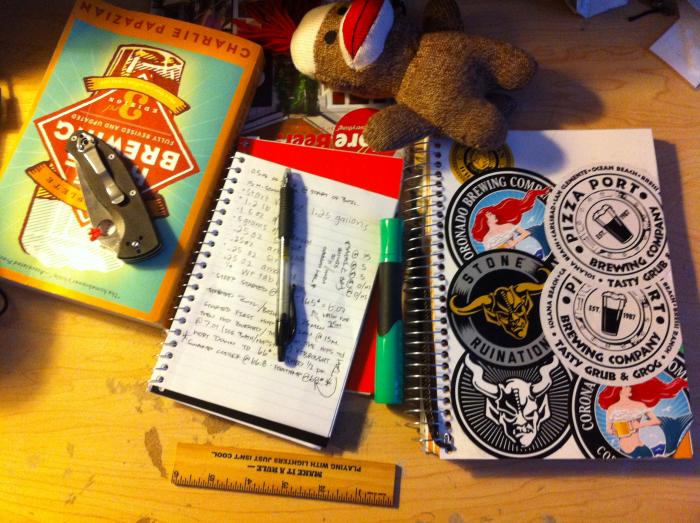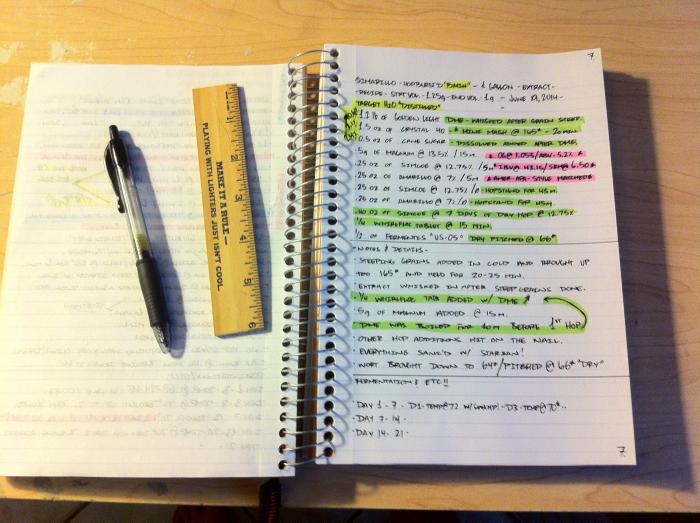FreshSafari
Well-Known Member
I decided to take a crack at this and start a thread for the beginner or strangers not part of HBT lurking on Google trying to get started.
When I first started brewing I did extensive research on what I needed to know and what I should and shouldn't be doing.. Most of the info I gathered from just reading the threads here were great.
I gathered info on just about anything the novice needs to know to make good beer, anything from Temp Control to Sanitation procedures.
Then I took the giant leap and said "Screw it I can do this." Purchased my first kit and got a kettle at Walmart on sale and the rest is history.
But after bottling my first batch and letting it carbonate and cold condition,
My first sip was unbelievable, IT WAS NASTY.
That's when I noticed that I never took any notes, wish I could of gone back and saw what I might have done wrong or what in the world happened.
NOTES, NOTES & MORE NOTES.
I bought a notebook slapped some stickers on the front and wrote down my recipes and Process.
1. Recipe - As in recipe schedule, what type of water, h20 volume (Start & End) type of yeast, any other ingredients that went into making this beer.
2. Notes & Details - How long my steeping grains went, how the hoping went, any boil overs, any hair, sweat, blood or tears. Close calls with a potential boil over, and if I hit all my hopping or other processes on time or any other mishap or mistake that could of gone wrong.
3. Fermentation & TEMPS - I keep a very close eye and detailed notes on ferm temp in the first 72 hours, I use a fermometer strip on my carboy.
I jot down notes if the ferm is aggressive, lag time, temp spikes and if the swamp cooler is working. Ambient temp gets written down. Along with other factors.
4. Tasting notes - I place these in a cheap 50 Cent paper folder.
I use the BJCP score sheet, and have one of my friends or SWMBO test the beer and write down what they taste. (& Myself of course)
Here's the link for the score sheet. http://www.bjcp.org/docs/SCP_BeerScoreSheet.pdf
Maybe I'm a nutjob but I was told when I first started this hobby that the only thing that separates a Great brewer from a good brewer is consistency.
With out notes I wouldn't know how to repeat or improve my recipes, I can stress it enough to the beginners starting or thinking about starting this sweet hobby, Take NOTES, NOTES, & MORE NOTES.
You can hand write them in a notebook like myself, keep a binder with printed out templates (I'll Post the link to a few) or keep them on a software.
The best log sheet is which ever one you WILL use regularly.
Thanks for reading this and please feel free to post pics of your notebook's or recipe sheets, links to templates, or just about anything.
Maybe we can continue to add to this list with links for people to follow.



When I first started brewing I did extensive research on what I needed to know and what I should and shouldn't be doing.. Most of the info I gathered from just reading the threads here were great.
I gathered info on just about anything the novice needs to know to make good beer, anything from Temp Control to Sanitation procedures.
Then I took the giant leap and said "Screw it I can do this." Purchased my first kit and got a kettle at Walmart on sale and the rest is history.
But after bottling my first batch and letting it carbonate and cold condition,
My first sip was unbelievable, IT WAS NASTY.
That's when I noticed that I never took any notes, wish I could of gone back and saw what I might have done wrong or what in the world happened.
NOTES, NOTES & MORE NOTES.
I bought a notebook slapped some stickers on the front and wrote down my recipes and Process.
1. Recipe - As in recipe schedule, what type of water, h20 volume (Start & End) type of yeast, any other ingredients that went into making this beer.
2. Notes & Details - How long my steeping grains went, how the hoping went, any boil overs, any hair, sweat, blood or tears. Close calls with a potential boil over, and if I hit all my hopping or other processes on time or any other mishap or mistake that could of gone wrong.
3. Fermentation & TEMPS - I keep a very close eye and detailed notes on ferm temp in the first 72 hours, I use a fermometer strip on my carboy.
I jot down notes if the ferm is aggressive, lag time, temp spikes and if the swamp cooler is working. Ambient temp gets written down. Along with other factors.
4. Tasting notes - I place these in a cheap 50 Cent paper folder.
I use the BJCP score sheet, and have one of my friends or SWMBO test the beer and write down what they taste. (& Myself of course)
Here's the link for the score sheet. http://www.bjcp.org/docs/SCP_BeerScoreSheet.pdf
Maybe I'm a nutjob but I was told when I first started this hobby that the only thing that separates a Great brewer from a good brewer is consistency.
With out notes I wouldn't know how to repeat or improve my recipes, I can stress it enough to the beginners starting or thinking about starting this sweet hobby, Take NOTES, NOTES, & MORE NOTES.
You can hand write them in a notebook like myself, keep a binder with printed out templates (I'll Post the link to a few) or keep them on a software.
The best log sheet is which ever one you WILL use regularly.
Thanks for reading this and please feel free to post pics of your notebook's or recipe sheets, links to templates, or just about anything.

All Grain
http://www.brewersfriend.com/brewday-allgrain/
http://hbd.org/cgi-bin/recipator/recipator
http://www.radicalbrewing.com/rbws1.pdf
http://braukaiser.com/download/brewing_logbook_english_US_units.pdf
http://hbd.org/cgi-bin/recipator/recipator
http://www.radicalbrewing.com/rbws1.pdf
http://braukaiser.com/download/brewing_logbook_english_US_units.pdf
Partial Mash
Extract
Maybe we can continue to add to this list with links for people to follow.






